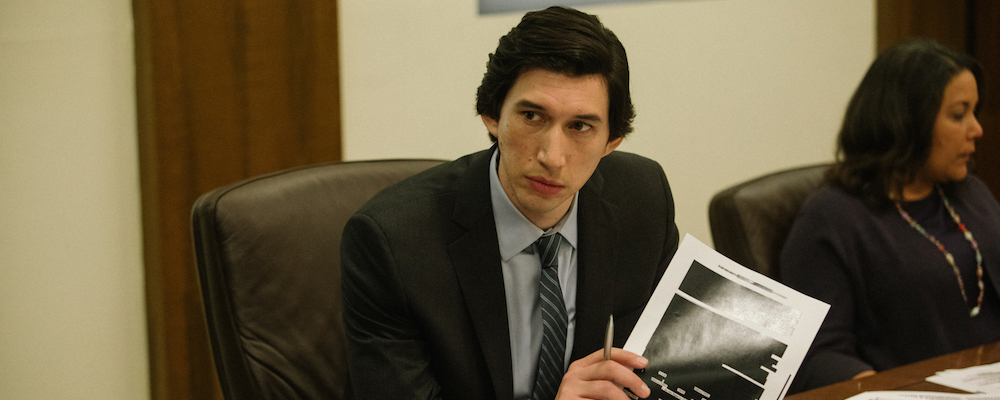‘The Report’ Interrogates Post-9/11 Ethics Like a 1970s Political Thriller
Andrew Bundy
When Daniel J. Jones (Adam Driver) first walks into the computer lab provided by the United States Senate for him to conduct an investigation into the CIA’s troubling use of “enhanced interrogation tactics,” the former FBI employee asks where the printer is. He is told there is none because “paper has a way of getting people into trouble.” “Isn’t that how we keep track of laws, though?” Jones questions.
“The Report,” a post-9/11 throwback to the paper trail conspiracy thrillers of the ‘70s, is as educational as it is deliberately disorienting. Screenwriter Scott Z. Burns’ second directorial effort owes much of its style to new Hollywood staples such as “All the President’s Men” and “The Parallax View,” using a classic genre formula to interrogate the ethical consequences of partisan pettiness in contemporary politics.
Fractured and fragmented by a few different framing devices, “The Report” constantly cuts back and forth between various stages of its real-life timeline, from 2003 to 2011. Initially driven by CIA flashbacks — shot through a grainy yellow filter with handheld camerawork — telling the origin story of the interrogation program’s torture techniques, which were “reverse-engineered” to create a “learned helplessness” in Al-Qaeda suspects. While the film’s subject matter is not for the faint at heart, it’s a profoundly effective political thriller featuring an outstanding lead performance from Adam Driver, who has proven him to be one of the finest actors working today.
As Jones uncovers black site tapes that were deleted, he learns more about the despicable tactics implemented and sanctioned by senior government officials through communication files and email correspondences. Jones meets with an undercover agent who informs the investigator that his personal findings on a “rapport building” strategy were buried in favor of techniques like sleep deprivation and waterboarding, continually bringing more proof of inhumane misconduct to Senator Dianne Feinstein (Annette Benning).
Despite the mounting evidence that the United States government was signing off on torture and then covering it up, Jones seems to be the only man fighting this losing battle to uncover the truth, while his team slowly quits. But Feinstein is incredibly concerned about misinformation being misappropriated, fearing they may not have enough actionable intel, allowing the CIA to point fingers at other departments and create an endless circle of hyperbole if they find a single disputable fact that they can use to discredit the investigation, or even Jones himself.
But, after crossing the proverbial Rubicon, angering and embarrassing former CIA director John Brennan (Ted Levine) with his findings, Jones is forced to hire a lawyer (Corey Stoll) when the CIA pursues legal action against him, in an effort to brand the Senate investigator as the treasonous successor to Edward Snowden. But Jones isn’t a whistleblower, the whistleblowers simply keep coming to him with horrific stories to tell. Character actor Tim Blake Nelson is excellent in a small role as a black site physician’s assistant, who contacts Jones after witnessing the inhumanity firsthand, realizing he was hired in place of a medical practitioner who has taken a “do no harm” oath.
Addressing a vast array of issues in an almost snow globe-esque, hard intelligence, story vacuum, “The Report,” can get bogged down by stretches of rambling exposition, but it’s never a boring watch. The score keeps a steady dramatic pulse, ever so slightly escalating, but not quite coming to a crescendo. If the film has one flaw, it’s arguably so stylistically consonant that one almost grows numb to the aesthetic and subject matter, likely intended to mirror Jones’ sleepless nights and the exhaustive, seemingly never-ending, investigative process. Burns’ film captures the feeling of a five year blur that comes from reading an insurmountable amount of computer files, but “The Report,” only builds to one major emotional explosion, ending abruptly. There is no denouement and the narrative is lacking a stronger culminating release of some kind.
“Get it right, get it done, worry about changing the world later,” someone tells Jones when he’s almost given up all hope. Subtlety isn’t a word Scott Z. Burns seems too concerned with. Information is the driving factor of this political thriller, much of it redacted, much else falsified. But, according to the CIA, lives saved overshadows accountability and whomever writes history determines who we hold liable. When a country’s intelligence agency is prone to spy on their own Congress, how is justice ever to be served? Surely, that’s a valid inquiry.
“The Report,” opens Nov. 15 in select theaters and begins streaming Nov. 29 on Amazon Prime.

